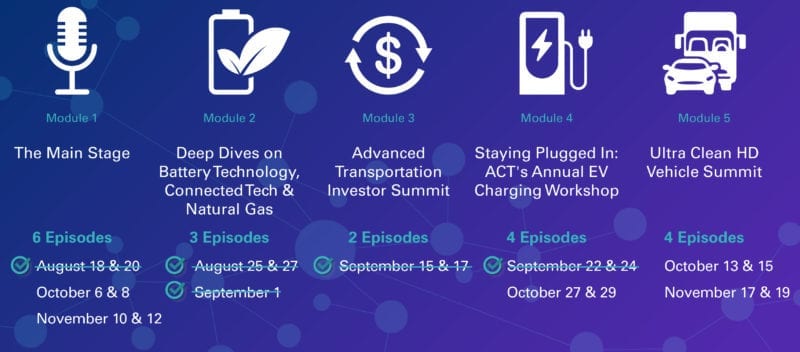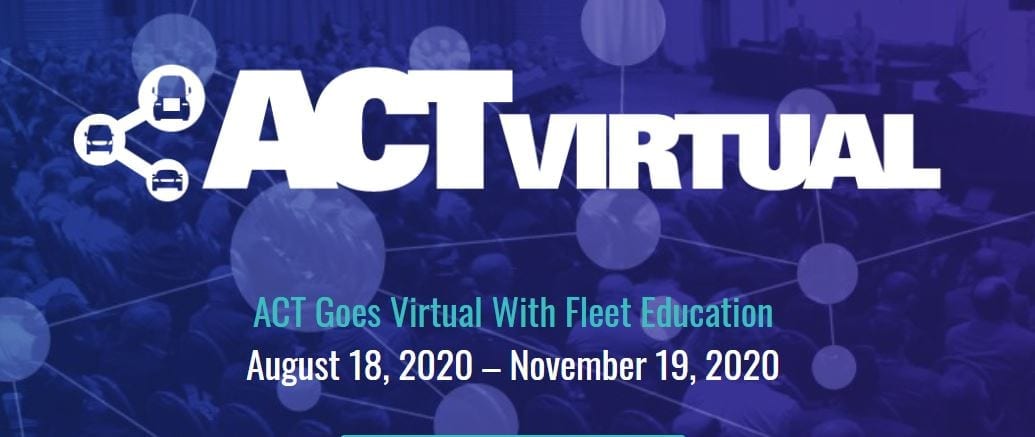The Advanced Clean Transportation (ACT) Virtual online event series kicked off August 18, spotlighting the latest vehicle technology and fueling infrastructure innovations that can help fleets reduce fuel costs and emissions. The ACT virtual event series was launched following the postponement of the annual ACT Expo – North America’s largest advanced transportation and clean fleet event.
ACT Virtual features 19 days of fleet-focused education, called “episodes,” spotlighting the latest transportation innovations.
ACT Virtual features 19 days of bite-sized fleet-focused education, called “episodes,” which cover everything from battery technology, to connected tech, renewable fuels, fleet charging, clean tech investment trends, funding, and more. To date, ACT Virtual has hosted nine episodes packed with dynamic keynote presentations, engaging panel discussions, video networking roundtables, tech demos, press events, and a virtual exhibit hall.
With so much content jammed into each episode, it is impossible to recap all the amazing insight that has been shared to date. Here is a glimpse of what our keynote speakers have shared.
August 18 Keynote: Peter Voorhoeve, President of Volvo Trucks North America, highlighted the company’s continued commitment to zero-emission transportation solutions, including a spotlight on the innovative Volvo LIGHTS project they are leading in partnership with 15 other organizations to successfully commercialize Class 8 battery-electric trucks. Voorhoeve shared that Volvo will have commercial production starting in just a few weeks at their Virginia assembly facility and will be offering short-term trials to support fleets in embarking on an unpaved path toward electrification. This includes adding 70 more Class 8 battery-electric trucks as part of a joint initiative with the South Coast AQMD and EPA Targeted Airshed.
August 25 Keynote: Chintan Sopariwala, VP of Aftersales Operations and Connected Vehicles from Navistar, highlighted how connected technology provides fleets the ability to save money, increase safety, improve retention, and maximize electric operations. Throughout his presentation, Sopariwala reiterated how essential it is for fleets keep their end goal top-of-mind and not miss the bigger picture, reminding attendees that “not all data is good data.” Sopariwala’s key advice was to ensure that all systems are pulling information from a central database and to focus on “actionable” data from TSPs and OEMs.
September 1 Keynote: Sven Schulz, Chief Executive Officer of AKASOL, provided an overview of the current state of battery technology and future expectations. As one of the top companies with battery technology that is actively utilized in commercial applications, Schulz shined light on the current technology constraints, as well as short-term and long-term goals for improvements.
September 15 Keynote: Jay Craig, Chief Executive Officer and President of Meritor, provided his view on the future of commercial transportation electrification. Craig has led Meritor through several strategic acquisitions and product launches over the past few years, including the 2018 introduction of Meritor’s Blue Horizon technology brand representing the company’s platform of electric drivetrains for Class 4-8 trucks and buses. During his keynote, Craig shared his team’s projected adoption curve for electrified commercial vehicles, the key forces driving the current momentum in the industry, and his own performance review of competing electric drivetrain solutions.
September 17 Keynote: Michael Linse is the founder and managing director of Linse Capital, a growth equity investing firm focused on late stage transportation and energy technology companies. Linse provided valuable advice on how entrepreneurs can overcome challenges to raising capital, as well as how investors can increase the chance of identifying winners—referencing his successful investments in advanced technology companies like ChargePoint, Redaptive, and Valens.
September 22 Keynote: Annette Clayton, CEO and President of Schneider Electric North America, shared her views on what organizations need to consider to help build a successful future for EV’s, including developing sound partnerships, engaging in innovative solutions, and keeping an eye toward the goal of creating a more sustainable world for all.
September 24 Keynote: Rustam Kocher, Emobility Ecosystem Lead, Daimler Trucks North America, provided valuable insight on early lessons learned from his team’s first heavy-duty battery-electric truck pilots, including the importance of charging standardization to help the market reach scale. He also shared updates on the standardization effort for High-Power Charging for Commercial Vehicle (HPCCV), based on his work as part of the CharIN Task Force.
There is Still Time to Participate!
ACT Virtual has 10 more episodes on the calendar through November 19th.
ACT Virtual has 10 more episodes on the calendar through November 19th. In the October 27 and 29th episodes, industry experts will discuss EV fleet smart charging and cost control, including how fleets should navigate time-of-use rates and manage demand spikes, as well as, how to power EVs using advanced energy management systems and techniques, such as solar, storage and microgrids. November episodes will spotlight sustainability in urban mobility, advancements in refrigerated transportation, electric retrofits, the future of biofuels, and more.
Whether you are looking to see the latest technology firsthand, network with peers and industry leaders, or learn about the future of transportation, ACT Virtual has something for you. Register at act-virtual.com.



